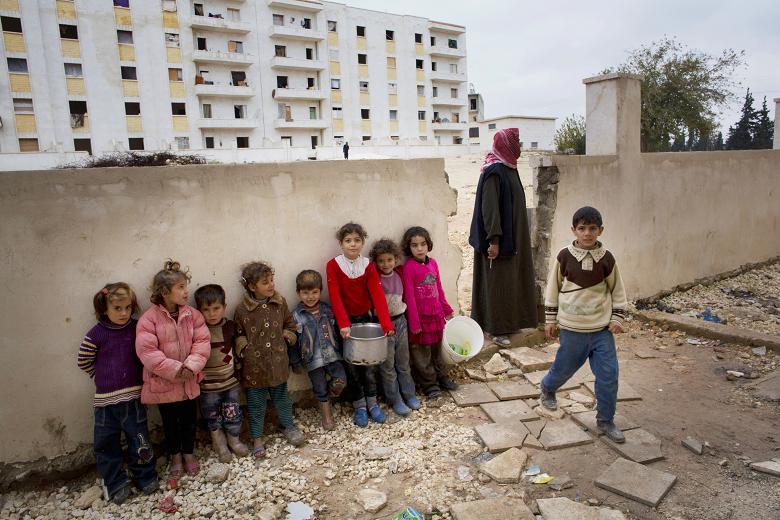As winter approaches, and amid reports of a growing humanitarian crisis in besieged Damascus suburbs, international aid agencies say they face difficulties getting vital supplies of food and medicines to vulnerable communities.
The World Food Programme, which says it aimed to deliver food aid to three million people in Syria during its September distribution cycle, told EA on Tuesday that it has had problems getting supplies through.
Abeer Etefa, a spokesperson for WFP, said that, “deliveries of food rations continue to be delayed due to security risks on the roads, checkpoints, restrictions on access and the constant shift of control lines across the country.”
Civilians in opposition-controlled areas hardest-hit by the ongoing fighting and regime sieges appear to be the hardest to reach.
A regime-imposed siege, which began in November 2012, has prevented food and other vital supplies from reaching the West Ghouta town of Moadamiyyat Ash Sham in the Damascus suburbs.
According to Etefa, WFP has had “limited or no access to some people for several months now especially in Aleppo, some parts of Homs, Al Hassakeh and even just outside the capital in Rural Damascus.”
Etefa said that WFP delivers food to both government and opposition-controlled areas in Syria’s 14 provinces, noting that, “some areas on different sides of the conflict are hard to reach due to the conflict and fighting.”
Another issue for food deliveries, particularly to Syria’s northeastern provinces, is that roads have become either completely inaccessible for aid agencies or insecure.
Etefa said that WFP is moving an average of 32,000 metric tons of food each month across Syria in 1,200 trucks.
Aid agencies like WFP face additional difficulties in getting food through to civilians, however.
Last month, on September 26, activists reported that regime forces in Madaya Valley had been spotted taking food aid parcels from a WFP truck. Syria Newsdesk, which uses locally based journalists, reported:
The convoy consisted of several vehicles. Two white SUVs with UN printed on their sides were parked at the checkpoint, and a pickup truck loaded with boxes labelled with WFP’s branding was parked on the side of the road. A Syrian Army flatbed arrived and parked next to the truck.
Workers then unloaded about two-thirds of the aid supplies to the army vehicle, while soldiers observed the transfer.
WFP’s Etefa confirmed that Syrian Arab Army personnel had confiscated the aid supplies.
“WFP recently had an incident of confiscation of 400 food rations on 26 September in Jisr Al Hamaa and Zabadani in Rural Damascus at military check points. WFP has taken this up with the Syrian authorities at different levels to seek their support to have the commodities returned,” Etefa said.
According to Etefa, the September 26 incident is not the first occasion that aid supplies destined for civilians have been confiscated at checkpoints.
Etefa said that between July 2012 and July 2013, WFP recorded 85 incidents of armed robbery or looting at checkpoints.
“Some of the food was recovered after cooperation with local authorities and communities in the areas where these incidents took place,” Etefa added.
However, Etefa said that the amount of food aid confiscated or looted is minimal compared to the amount of aid that gets through.
“Approximately 1,845 tons (or just 1 percent of all dispatches) remains unaccounted for,” she added.
Activists say that the problem of food aid confiscation by the regime is more wide-scale, however, and that aid from other agencies including the Red Crescent is being looted at checkpoints and distributed to regime soldiers.
According to activists, some stores in regime-controlled areas are selling WFP-labelled food.
And as food aid fails to reach civilians in Syria’s most vulnerable communities, the situation could get worse as winter sets in.
WFP’s Etefa notes that, “Humanitarian access is essential to avoid a situation in which hunger becomes an additional factor that pushes even more people to flee the country.”
The warning comes as Turkey’s closure of the border crossing near Azaz in northern Syria has led to a reduction in the amount of supplies that agencies can bring into the country.
The US State Department said Monday that some “non-lethal” supplies are still getting into the country from Turkey.
However, the closure of the border crossing means that those Syrians seeking to flee the country to avoid the fighting will have to remain on the border region, where they are particularly vulnerable.

